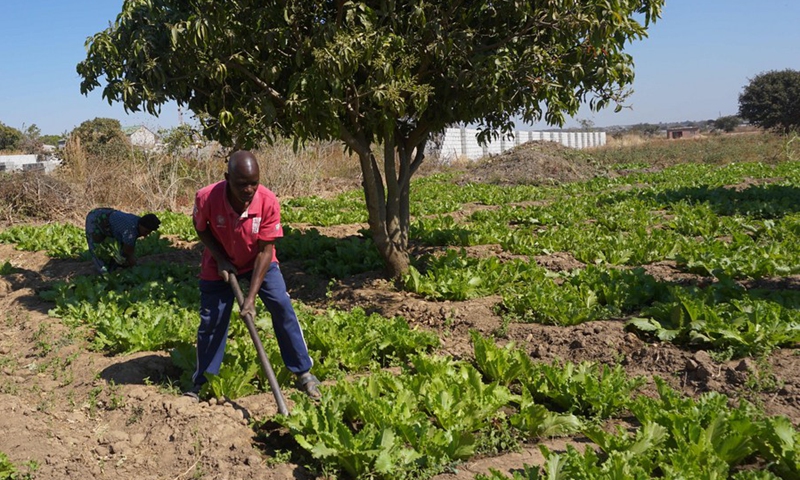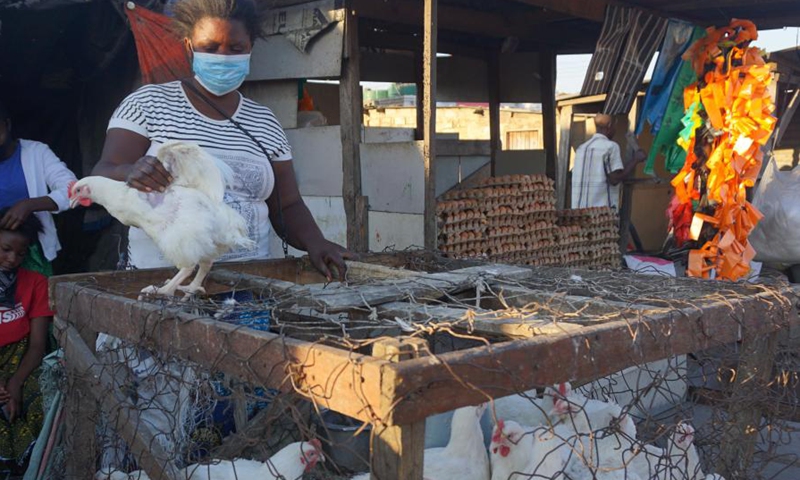
Patrick Daka, a vegetable cultivator, tends his produce in Chibombo district, central Zambia, on July 5, 2021. (Photo: Xinhua)

Ruth Phiri, a trader specialized in reselling poultry, works in Lusaka, Zambia, on July 5, 2021. (Photo: Xinhua)
Maureen Mubanga a resident of Lusaka, Zambia's capital, has made it a point to grow vegetables in her backyard for domestic consumption.
Growing a variety of vegetables also gives 45-year-old Mubanga, an elementary teacher, some extra income which she uses to supplement her monthly earnings.
"Vegetable cultivation is something I have been doing for the past three years. I get almost all vegetables straight from my garden, which gives me more than enough for domestic consumption, and sell excess produce to my workmates," she explained.
For most urban populations in Zambia, urban agriculture is not a new development. City dwellers and persons from peri-urban have long been using unoccupied areas for agriculture production. What is probably new is the commercialization of the practice.
It is has become increasingly common for individuals and communities in Zambia to be engaged in some form of agriculture activities to ensure household food security as well as enhance nutritional needs.
This is case for 60-year-old Patrick Daka a resident of Mpandika area in Chibombo district, central Zambia.
Daka who has for over five years been involved in vegetable cultivation to supplement his family's income explains that the exercise has enabled him to pay for his children's school fees and to meet other domestic budgetary needs.
"I earn an average of 2,000 Zambian Kwacha (approximately 88 U.S. dollars) every month from the sale of vegetables. Vegetable cultivation has greatly helped my family to stay afloat financially," he said.
Daka also mentioned that aside from growing a variety of vegetables, he also uses his gardening space to cultivate sugarcane and maize, for consumption as well as for sale.
"As a family, we no longer buy maize meal because we cultivate the maize. We just take the maize to a mill plant to have it processed into maize meal," Daka explained.
Aside from vegetable production, an increasing number of urban dwellers are also turning to livestock production for sustenance and as an income-generating venture. Piggery, fish farming and poultry production are some of the ventures that populations in the aforementioned areas are involved in.
"I have been involved in production for the past two years and it has proved to be a worthwhile undertaking. I started with only 200 small birds and now I have over 2,500 birds that are at different stages of growth," revealed Agnes Simukanga, a poultry farmer from Shifwankula area, central Zambia.
An elated Simukanga further asserted that farming only provides households with food but also helps individuals to stay active.
"It is practically impossible to lead a sedentary life when you are involved in agriculture because it requires one to be up and about," she pointed out.
The 61-year-old Simukanga further noted that agriculture is not only a fulfilling venture but also one that offers urban dwellers opportunities to earn a living from, more so now with the increase in populations.
And in terms of opportunities, urban agriculture is providing small-scale resellers with produce that is readily available, thereby cutting down costs.
"I order my chicken from poultry farmers within my community. There are currently a number of people engaged in poultry production within Mandevu compound from whom I get chickens from," said Ruth Phiri, a trader specialized in reselling poultry.
Phiri revealed that she earns a minimum of 1500 Zambian Kwacha from reselling chickens, a business she has been involved in for over two years.
She observed that the growth and development of urban farming is helping low-income communities to engage in income an array of agric-businesses to better themselves.
Experts note that urban agriculture expands the economic base of the city through production, processing, packaging, and marketing of consumable products. This in turn increases business and entrepreneurial activities and the creation of jobs.
In urban areas where people need to spend a lot on financial resources to survive, agriculture helps to increase savings in household expenditure on consumables, which increases the amount of financial resources allocated to other needs.
